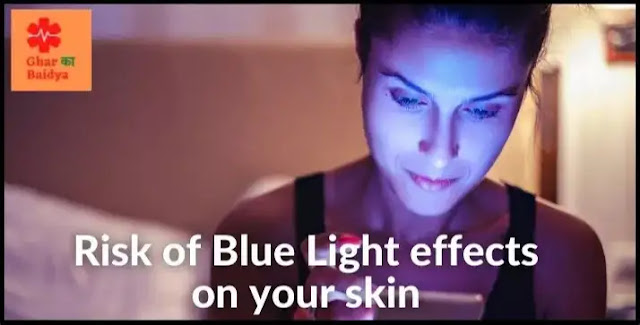 |
| Beware of the risks of blue light on your skin |
Almost everyone is aware of the sun's UV rays and their
effects on the skin, such as tanning, premature skin aging, pre-cancerous skin
lesions, and skin malignancies, as well as how to protect themselves from these
dangerous rays. We must all be aware of the long-term impacts of UV radiations,
but there is now a new problem to add to this list i.e. blue light. Long exposures to this blue light can lead to DNA damage, cell and tissue death, injury, eye skin barrier damage, and even aging. In this article, we will cover the damages blue light has on our skin.
What is blue light?
Blue light rays are the electromagnetic spectrum's short-wavelength, high-energy visible light rays. The wavelength is between 380 and 500nm. Due to their shorter wavelength, they can penetrate the skin to a depth of 1.5 mm and scatter more easily due to their high energy. Long-term exposure to blue light can cause serious skin damage.
Important sources
- Sun: The sun is the most important natural source of blue light.
- Electronic Gadgets: It is emitted by smartphones, tablets, computers, and television screens. Certain wavelengths of blue light, at varying degrees of brightness, have been shown to produce skin changes.
Blue light effects on skin
Blue light is responsible to generate reactive oxygen species that induce oxidative damage to the skin. According to preliminary studies, blue light can trigger the creation of free radicals, which break down collagen and create inflammation, resulting in:
- Redness,
- Dark spots,
- Early wrinkles and premature skin aging,
- Sagging skin
- Too much blue light can also darken the skin tone.
- Hyperpigmentation, especially in people who are genetically predisposed to it.
Research confirms that blue light from electronic gadgets can cause changes in your skin cells, such as cell shrinkage. These hasten the aging process. These alterations can be triggered by exposures as short as 60 minutes.
Read | Scientists found out a key enzyme that shows how exercise is effective for anti-aging
How to protect your skin from blue light?
1. Use sunscreen: Not all
sunscreens offer blue light protection. It is best to use modern broad-spectrum
sunscreens with improved nano-particles that provide better UVA, UVB, and
visible light protection.
2. Antioxidants such as vitamin
C, vitamin E, and ferulic acid can be used in conjunction with sunscreen to
increase its effectiveness.
3. If you spend most of your
time working in front of a computer, use blue light screen protectors.
4. In the event of a cellphone
or laptop, enable the night mode. It changes the blue light emission and converts it into yellow which is less harmful.
5. Try Oxy-Facials at your home to maintain and revive the under-skin cellular functions properly.
6.
To reduce digital eye strain, follow the 20-20-20 rule. Every 20 minutes, take
a 20-second break to look at anything 20 feet away.
7.
Set up a good working distance and posture for screen viewing, and control the
lighting and glare on the device screen.
8.
For night lights, use faint red lights. Red light is less likely to disrupt the
circadian cycle and decrease melatonin production. Avoid gazing at bright
screens two to three hours before going to bed.
9.
Consider using blue-blocking glasses or installing an app that filters the
blue/green wavelength at night if you work a night shift or use a lot of
electronic gadgets at night.
10. Allow yourself to be exposed to a lot of bright light during the day, which will improve your ability to sleep at night as well as your mood and alertness during the day.
Read | Skin Cancer- its causes, symptoms, types, and prevention methods
Blue Light Therapy
- Blue light treatment is a kind of light therapy that employs light to treat problems beneath the skin. It is a painless operation.
- It is done by combining photosynthesizing medicines and high-intensity light sources.
- The light employed is natural violet or blue light, and it is regarded as an alternative treatment.
- Blue light treatment is most typically used to cure sun damage and premalignant or malignant skin cancer growths, as well as other sorts of skin problems such as acne and scarring. It is also used to treat depression.
The Blue Light Therapy Procedure:
- Immediately following treatment, the area may be red, puffy, sensitive, and somewhat bruised or blistered (Due to the application of medicine)
- A skin infection can become a risk if any post-treatment blisters emerge and are burst or untreated.





If you need more information about the helping topics, please write to us. we will revert you soon